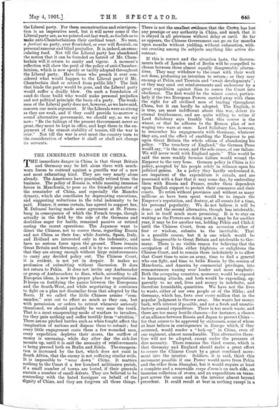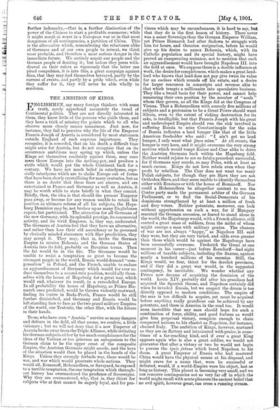THE IMMEDIATE DANGER IN CHINA T HE immediate danger in China
is that Great Britain and Germany may be left alone there with much- worn forces to contend against a guerilla war of a new and most exhausting kind. They are very nearly alone already. The Americans have practically retired from the business. The policy of Russia is, while massing immense forces in Manchuria, to pose as the friendly protector of the remainder of China, and especially the Manchu dynasty, which she conciliates by deprecating executions, and suggesting reductions in the total indemnity to be paid. France, it seems certain, has agreed to support her, M. Delcasse having made some agreement at St. Peters- burg in consequence of which the French troops, though actually in the field by the side of the Germans and doubtless eager for battle, remained passive or retired auring the recent operations. The Japanese want to direct the Chinese, not to coerce them, regarding Russia and not China as their foe; while Austria, Spain, Italy, and Holland are interested only in the indemnity, and have no serious force upon the ground. There remain Great Britain and Germany, and it is by no means certain that they are strong enough without large reinforcements to carry any decided policy out. The Chinese Court, it is evident, is not yet in despair. It makes no profession of submitting without discussion. It does not return to Pekin. It does not invite any Ambassador or group of Ambassadors to Sian, which, according to all European ideas, is now the proper . place for negotiations. It keeps on fortifying the passes between the Europeans and the South-West, and while negotiating it continues to fight on a plan not dissimilar from that adopted by the Boers. If we called the little Chinese armies "com- mandos," sent out to effect as much as they can, but with permission or orders to retreat whenever seriously threatened, we should probably be very near the truth. That is a most exasperating mode of warfare to invaders, for they gain nothing and suffer terribly from " attrition." There are no pitched battles such as when fought affect the imagination of nations and dispose them to submit ; but every little engagement costs them a few wounded men, every expedition depletes their stores, the outflow of money is unceasing, while day after day the sick-list mounts up, until it is said the necessity of reinforcements is being pressed both on Berlin and Simla. The exaspera- tion is increased by the fact, which does not exist in South Africa, that the enemy is not suffering similar evils. It is impossible to "wear down" China. It matters nothing, to the Court if a few hundred militiamen perish, if a small number of towns are looted, if their generals sustain a number of small defeats. They are believed to be contending with the hated foreigner on behalf of the dignity of China, and they are forgiven all those things. There is not the smallest evidence that the Crown has lost any prestige or any authority in. China, and much that it is obeyed in all provinces without delay or cavil. So far as appears, the Chinese Government can go on for months upon months without yielding, without exhaustion, with- out creating among its subjects anything like active dis- content.
If this is correct and the situation lasts, the Govern- ments both of London and of Berlin will be compelled to choose between three almost equally disagreeable alterna- tives. They may withdraw to the coast with their work not done, professing an intention to return ; or they may encamp at Pekin and Tientsin and "await developments"; or they may send out reinforcements and endeavour by a great expedition against Sian to coerce the Court into obedience. The first would be the wisest course, particu- larly if the two European Powers carried away with them the right for all civilised men of trading throughout China, but it can hardly be adopted. The English,- it is true, are most indifferent about this war, detest its eternal fruitlessness, and are quite willing to retire if Lord Salisbury says frankly that this course is the wisest., or that he adheres to the Roman plan of not waging two wars at once. Lord Salisbury has, however, to remember his engagements with Germany, whatever they are, and the effect of enabling the Emperor to put upon Great Britain the whole odium of abandoning his policy. " The treachery of England," the German Press would say, " is the cause, and the sole cause, of our failure. We will never work with England again." This would be said the more readily because failure would wound the Emperor to the very bone. German policy in China is his policy, accepted by his people solely in reliance upon his political genius. As a policy they hardly understand it, are impatient of the expenditure it entails, and are possessed with a fear that it may some day, by embroiling them with Russia and France, render them dependent upon English support to protect their commerce and their coasts. To retire without provinces and without as many millions as have been spent would be to impair the Emperor's reputation, and destroy, at all events for a time, his personal popularity. We do not believe it will be done ; and the second alternative, though less intolerable, is not in itself much more promising. It is to stay on waiting as the Powers are doing now, it may be for another year, it may be for another ten, holding Pekin and Chih-li until the Chinese Court, from an accession either of fear or wisdom, submits to the inevitable. That is a possible course, but it is one which would be most disagreeable to Great Britain and intolerable to Ger- many There is no visible reason for believing that the occupation of Pekin either frightens or enlightens the Chinese Court, and to remain there indefinitely is to allow that Court time to raise an army, time to find a general who can fight, and time to bribe Russia by the cession of Manchuria, and America by commercial privileges, into remonstrances waxing ever louder and more emphatic. Both the occupying countries, moreover, would be exposed to harassing attacks, and both would be expending, ap- parently to no end, lives and money in indefinite, and therefore formidable, quantities. We have not the lives to waste, either of our own people or of the Sikhs ; and Germany, which has, frets over every million that in the popular judgment is thrown away. She wants her money back, with interest if possible, and not a fresh and unsatis- factory annual expenditure. There is too much waste, and there are too many hostile chances—for instance, a chance of an alliance between Russia and Japan to protect China— for that course to be approved by statesmen, some of whom at least believe in contingencies in Europe which, if they occurred, would render a " lock-up " in China, even of one regiment, almost unendurable. This alternative there- fore will not be adopted, except under the pressure of dire necessity. There remains the third course, which is that Germany and England should make a great effort to coerce the Chinese Court by a great combined move- ment into the interior. Soldiers, it is said, think this movement possible if one Power would move from Pekin and the other from Shanghai, but it would require at least a complete and a renewable corps d'arntee on each side, an immense collection of stores, and an expenditure on trans- port across the ocean and in the interior almost beyond precedent. It could result at best in nothing except in a further indemnity,—that is, a further diminution of the power of the Chinese to start a profitable commerce ; while rt might result at worst in a European war or in that most dangerous of all contingencies, a partition of China. This is the alternative which, remembering the reluctance alike of Germans and of our own people to retreat, we think most probable, and therefore a most serious danger in the immediate future. We entirely acquit our people and the German people of desiring it; but unless they press with- drawal on their rulers so vigorously that the latter can plead compulsion, it is into this, a great campaign against Sian, that they may find themselves betrayed, partly by the current of events, and partly by a pride which, even while they suffer for it, they will never be able wholly to condemn.











































 Previous page
Previous page